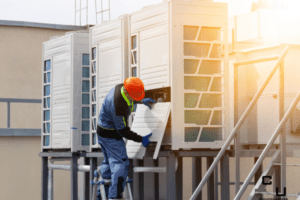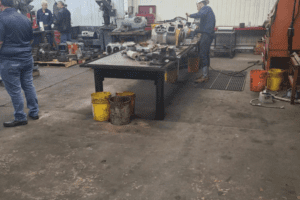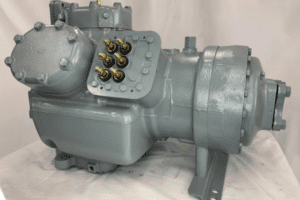No matter whether you’re working with a large commercial HVAC or a small residential system, blowing hot air is one of the most common problems that arises – by many estimates, the most common. That’s why it’s so important to have a clear idea of the factors that can cause this issue.
Luckily, the basic principles behind the largest commercial HVAC systems are the same as the smallest ones. Once you understand the potential root cause of blowing hot air, you’re on your way to a fix. In most cases, this doesn’t turn out to be a serious problem that threatens your commercial compressor.
That said, sometimes blowing hot air is a symptom of a larger situation unfolding within your system.
The sooner you get down to the bottom of it, the easier it will be to make sure that it’s only a temporary condition and not something that will reduce efficiency for your system in the long run. We suggest a regular maintenance schedule combined with plenty of replacement parts kept in stock.
Commercial HVAC Blowing Hot Air? These Are the Most Common Causes
Let’s take a look at some of the most common reasons for a commercial HVAC blowing hot air:
1. Refrigerant Leak
A more serious issue comes into play when there is a refrigerant leak. Unfortunately, you may already have lost a significant quantity of refrigerant before a leak is suspected. If the refrigerant is depleted at a much faster rate than seasonal usage would seem to indicate, don’t refill before checking for a leak.
Depending on the layout of your system, you might be best served using electronic leak detectors or ultraviolet dye to find your leak. After a fluorescent dye has circulated sufficiently through the system, a detection lamp can narrow down the exact location. Remember, there may be multiple leaks.
2. Out of Refrigerant
The biggest HVAC problem you’ll encounter on a day-to-day basis is also the simplest: You’re out of refrigerant. Refrigerant gas is a crucial input in any HVAC system, even when it is being used to warm the air rather than cool it. And refrigerant can run out faster than ordinary, even if refilled regularly.
As seasons change, they drive changes in usage patterns for your HVAC. Even if your HVAC is centrally controlled by a smart thermostat and doesn’t have user-managed temperature zones, it will still work harder in extreme temperatures. It’s essential to keep that in mind with today’s intense record highs.
Many modern commercial HVAC compressors are designed to accommodate more than one type of refrigerant. These are usually interchangeable when the system has run completely dry, so be sure to gauge refrigerant levels as your first move when you notice your HVAC blowing hot air.
3. Thermostat Malfunction
The thermostat will eventually need to be calibrated to enhance your system’s overall performance. This can fly under the radar when you have a newer smart thermostat – a situation where it’s easy to assume it’s working as intended. But smart thermostats can be sensitive in particular ways.
The more sophisticated your thermostat is, the more opportunities you have to save money as it works to improve overall efficiency. For the most part, this is done without much extra work from you. But there is one caveat: The thermostat’s sensors must be clean.
To get maximum performance from your thermostat and your commercial HVAC as a whole, understand precisely where these sensors are located. They should be logged in maintenance documentation since they will need to be replaced from time to time. Most often, however, they just need wiping down.
4. Ventilation Problems
If parts of your building have ordinary cold air and lukewarm or hot air, you may have a ventilation failure rather than a centralized issue caused by a malfunctioning component. This typically gets resolved by replacing or cleaning out air filters in a designated area.
Air filters in a large commercial HVAC need changing on a regular basis. That falls around once a quarter on average, but it can be sooner. Be sure you know whether you must completely replace or just clean a filter. If replacement filters are needed, keep them stocked up well in advance.
5. Electrical Problems
Rarely, electrical problems can be the cause of your commercial HVAC blowing lukewarm air. This tends to be the most serious outcome by a long way, and it can be hard to resolve. Your entire wiring system may need testing. Note if electric costs are rising or other electrical equipment has been failing recently.
Sometimes, a simple symptom has a sobering conclusion: You need to replace an HVAC compressor. A remanufactured commercial compressor lets you do this at a fraction of the cost without sacrificing your environmental standards or performance.












